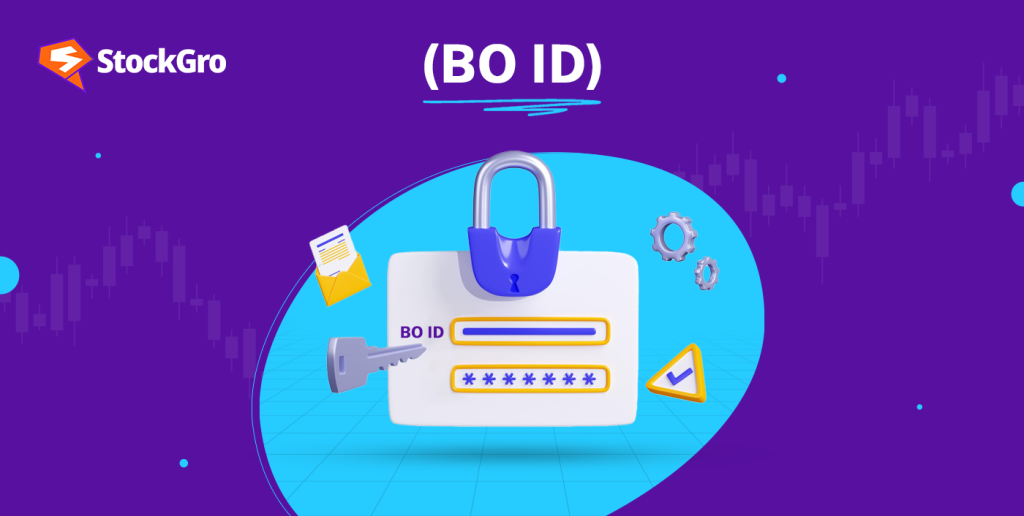
The beneficial owner identification number (BO ID) is a unique, 16-digit numeric code assigned to each demat account holder by their depository participant (DP). The computerised trading and management of securities depend much on this identification.
As of now, there are 15 crore demat accounts in India, with 9.2 crore unique investors on NSE. The addition of demat accounts in 2024 is expected to exceed 4 crore. This guarantees that every transaction recorded in a demat account is correctly linked to the legitimate owner, therefore improving the security and efficiency of the securities market.
This article attempts to demystify the BO ID, its relevance, and its function in the realm of demat accounts.
What is a BO ID?
Investors with shares in a demat account are granted a special 16-digit identifying number known as a beneficial owner identifying number. For every investor, this number provides a unique identification that guarantees accurate tracking and documentation of their securities market holdings.
Linking an investor’s demat account to the ownership of stocks, bonds, mutual funds, or other securities requires the BO ID, therefore guaranteeing safe and transparent transactions. In the stock market, where asset transfer and trading must be painstakingly recorded, this is extremely vital.
The Securities and Exchange Board of India (SEBI) supervises the BO ID regulatory structure to provide a safe procedure compliant with financial rules. Registered with depositories like NSDL and CDSL, depository participants are in charge of administering demat accounts on behalf of investors and producing BO IDs.
You may also like: NSDL and CDSL: Differences, Features, and Functions Explained
How to obtain a BO ID?
Usually when an investor registers a demat account with a depository participant, either a bank, broker, or another financial institution approved to provide demat services, a BO ID is issued.
You first must visit a DP and finish the required know your customer (KYC) procedures. This covers turning in necessary paperwork like a PAN card, which is required for stock market trading, address proof (utility bill, passport, etc.), and identification proof (Aadhar card, passport, etc.).
The DP will start creating your demat account and assign a special BO ID once the KYC process is finished and confirmed. It is noteworthy since the BO ID is unique to every demat account. If you have multiple demat accounts, you will have a distinct BO ID for each one.
You may also like: Understanding DP Names in IPO Applications and Their Importance
Finding your BO ID
Finding your BO number is straightforward. Typically, it shows up on the account statement your depository participant generates. If your DP provides an online platform, you can log in to access your account details and retrieve your BO ID there as well.
Though they are different, many investors mix the BO ID with the demat account number. Although generic account identification uses the demat account number, the BO ID is unique to monitoring your stocks ownership.
Your BO ID is a unique identification for your investments hence it is vital to keep it safe. By safeguarding this data, you help stop fraud, identity theft, or unwanted access to your demat account. Always store it safely and avoid sharing it unnecessarily.
Advantages of a BO ID
The beneficial owner identification offers several key benefits:
- Easy access to investments: Tracking your portfolio and online assets, including specifics on the stocks you own, past transactions, and any dividends earned, is simple with a BO ID.
- Efficient transfer of securities: BO ID saves time by simplifying the process of moving securities between accounts, therefore lowering the possibility of fraud or mistakes.
- Supports online trading: Online trading depends on the BO ID, your exclusive identification in the electronic trading system. It guarantees that only authorised people can trade, so helping to prevent fraud.
- Eliminates the risks of physical certificates: By using BO ID, one lessens the possibility of fraud and the hazards connected with physical certificates such loss, theft, or damage.
- Simplified record keeping: Maintaining correct investment records including transaction histories and dividend receipts becomes considerably simpler using BO ID.
Challenges and considerations with BO ID
While the BO ID offers many advantages, there are also certain limitations:
- Restricted to depository systems: Mostly used in Indian depository systems like NSDL and CDSL, BO ID does not apply to investments outside these systems or to physical securities.
- Reliance on depository participants: A DP assigns the BO ID, hence any changes to your information, such as your address or phone number, depend on the DP. Updates of your data can cause delays or mistakes that cause inconvenience.
- Vulnerability to hacking and data loss: The BO ID runs the danger of data theft or hacking as it is connected to online trading and investment records. Strong security policies are absolutely vital to protect your BO ID and other private data.
- Limited use for offline transactions: Offline transactions, which still call for actual documentation like share certificates or transfer deeds, do not apply for the BO ID. For offline transactions, you will have to depend on conventional documentation.
Must read: Understanding Demat Account: Usage and Benefits Explained
Bottomline
Ensuring security, openness, and efficiency of the Indian securities market depends critically on the beneficial owner identification number. The BO ID helps to streamline record-keeping, guard against fraud, and enable easy trading by giving every investor a distinctive identity.
Although it has several benefits, including quick access to assets and effective securities transfer, its reliance on depository systems and exposure to cyber threats should be known even if it has several advantages.
Maintaining a seamless and safe trading experience depends on you as an investor protecting your BO ID. Understanding and managing your BO ID is a key step toward building a successful investment journey.
FAQs
Assigned to every demat account holder by their depository participant, the beneficial owner identification number is a unique 16-digit code. By connecting transactions to the rightful owner, this number guarantees effective and safe security of securities. It simplifies record-keeping, improves market security and openness, and supports flawless online trade. Tracking and handling Indian securities market investments depends on the BO ID.
Log in to your demat account on the web platform of your depository participant to retrieve your BO ID. Usually mentioned in the “account details” or “profile” section is your BO ID. Alternatively, review your account statement sent by your DP, which likewise contains your BO ID. Managing and following your securities on the Indian market depends on this special 16-digit code.
Log into your demat account via the CDSL Easi or Easiest platform to verify your beneficiary in CDSL. See and confirm your linked beneficiaries in the “beneficiary” section. Make sure your account is registered for access using CDSL Easi or Easiest. This technique lets you effectively and securely manage and verify the beneficiaries connected to your Demat account.
Assuring safe and effective handling of securities, the beneficial owner identification number is a unique 16-digit code provided to every demat account holder. Assigned by the depository (NSDL or CDSL), the eight-digit code known as the depository participant identification number belongs to the DP. The DP ID notes the intermediary handling the demat account; the BO ID notes the investor. Both are absolutely important for flawless securities transactions.
Dealing with reputable organisations like your depository participant or financial institutions usually means that sharing your beneficial owner identification number is normally safe. To stop possible use or fraud – avoid distributing it carelessly or via unreliable sources. Always make sure your BO ID and other personal data are kept safe and only given for account administration or transactions when quite absolutely required.

